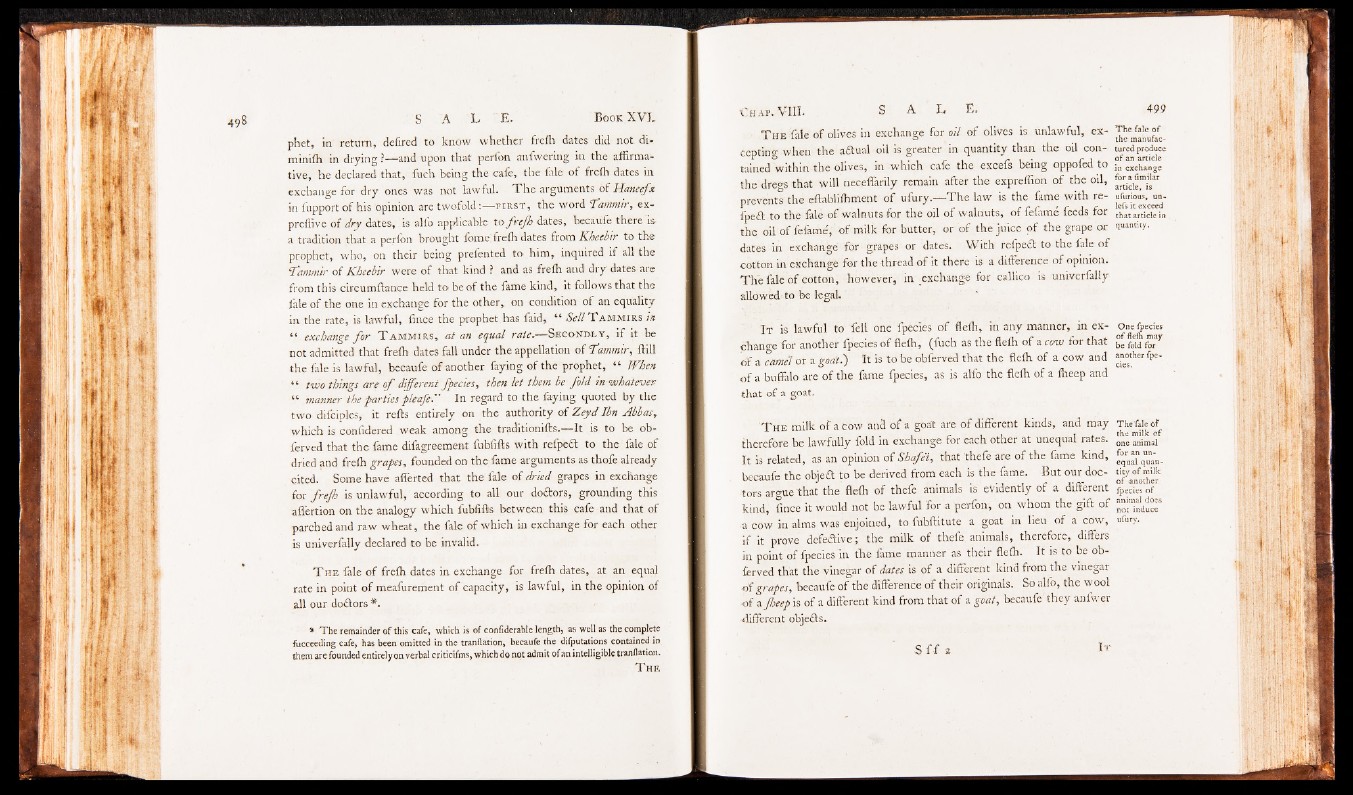
phet, in return, defired to know whether freih dates did not di-
minifti in drying ?— and upon that perlon anfwering in the affirma-
tive, he declared that, fuch being the cafe, the fale of freih dates in
exchange for dry ones was not lawful. T h e arguments of Haneefa
in fupport of his opinion are twofold *.— f i r s t , the word fammir, ex-
prelhve of dry dates, is alio applicable tofrejh dates, becaufe there is-
a tradition that a perlon brought fomc. freih dates from Kbeebir to the
prophet, who, on their being prefented to him, inquired if all the
1 'ammlr of Kheebir were of that kind' ? and as freih and dry dates-aie
from this circumftance held to> be of the fame kind, it follows that the
fale of the one in exchange for the other, on condition of an equality
in the rate, is lawful, lince the prophet has faid, “ Sell T a m m i k s in
“ exchange fo r T amm-I-rs, at an equal rate.— Secondly, if it be
not admitted that freih dates fall under the appellation of fammir, Hill
the fale is lawful, becaufe of another faying of the prophet, “ When
“ two things are o f different fpecies, then let them be fold in whatever
1 manner the parties pleafe." In regard to the faying quoted by the
two difeiples, it refts entirely on the authority of Zeyd Ibn Abbas,
which is conlidered weak among the traditionifts.— It is to be ob-
ferved that the fame difagreement fubfifts with refpect to the fale of
dried and freih grapes, founded on the fame arguments as thofe already
cited. Some have aflerted that the fale of dried grapes in exchange
for frejh is unlawful, according to all our doctors, grounding this
affertion on the analogy which fublifts between this cafe and that of
parched and raw wheat, the fale of which, in exchange for each other
is univerfally declared to be invalid.
T he fale of freih dates in exchange for freih dates, at an equal
rate in point of meafurement of capacity, is lawful, in the opinion of
all our doctors *.
* The remainder of this cafe, which is of confiderable length, as well as the complete
fucceeding cafe, has been omitted in the tranflation, becaufe the difputations contained in,
them are founded entirely on verbal criticifms, which do not admit of an intelligible tranflation.
T he
THEÏalé of olives in exchange for oil of . olives is unlawful, exception
when the aftual oil is greater in quantity than the oil con-
tained within the olives, in which cafe the excels being oppofed to
the dre<rs that will neceffarily remain after the expreffion of the oil,
prevents the eftablilhment of ufury.— The law is the fame with re-
fpeft to the fale of walnuts for the oil of walnuts, of fefamé feeds for
the oil of fefamé, o f milk for butter, or of the juice of the grape or
dates in exchange for grapes or dates. With refpect to the fale of
cotton in exchange for the thread of it there is a différence of opinion.
The fale of cotton, however, in exchange for callico is univerfally
allowed to be legal '
I t is lawful to fell one fpecies of flelh, In any manner, in ex-
chano-e for another fpecies of flelh, (fuch as the flelh of icow for that
of I camel or a goat.) It is to be obferved that the flelh of a cow and
o f a buffalo are of the fame fpecies, as is alfo the flelh of a Iheep and
that of a goat.
T he milk of a cow and of a goat are of different kinds, and, may
therefore be lawfully fold in exchange for each other at unequal rates.
It is related, as an opinion of Shafei, that thefe are of the fame kind,
becaufe the objeft to be derived from each is the fame. But our doctors
argue that the flelh of thefe animals is evidently of a different
kind, lince it would not be lawful for a perlon, on whom the gift of
a cow in alms was enjoined, to fuhftitute a goat in lieu of a cow,
if it prove defeââve ; the milk of thefe animals, therefore, differs
in point of fpecies in the fame manner as their flelh. It is to be ob-
ferved that the vinegar of dates is of a different kind from the vinegar
of grapes, becaufe of the difference of their originals. So alfo, the wool
-of a Jheep is of a different kind from that of a goat, becaufe they anfwer
-different objects.
T h e fale o f
the manufactured
produce
o f an article
in exchange
for a fimilar
article, is
ufurious, un-
lefs it exceed
that article in
quantity.
One fpecies
o f flelh may
be fold for
another fpecies.
The fale C»F
the milk o f
one animal
for an unequal
quantity
o f milk
o f another
Ipecies of
animal does
not induce
ufury.
S f f i m